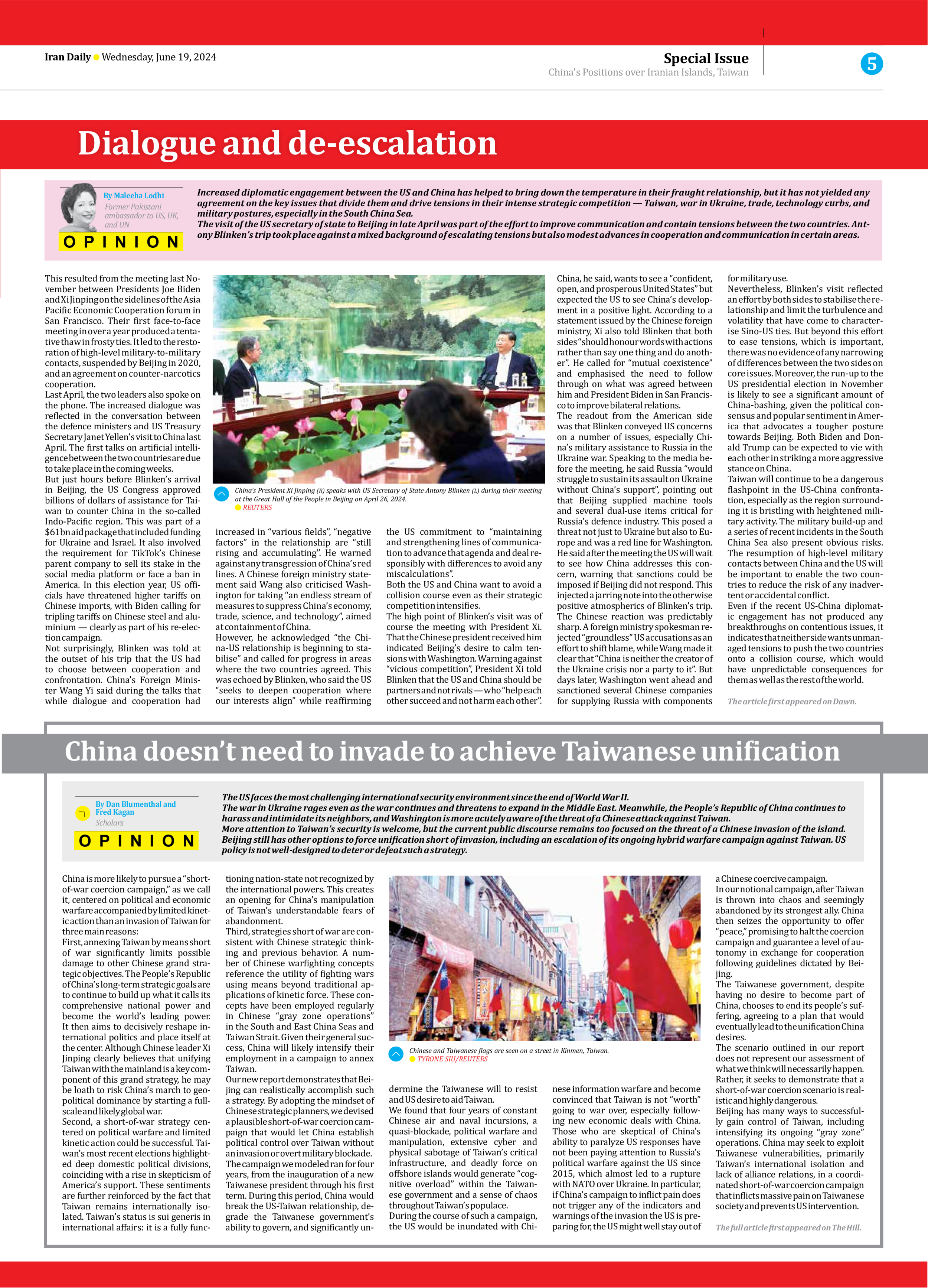
China doesn’t need to invade to achieve Taiwanese unification
The US faces the most challenging international security environment since the end of World War II. The war in Ukraine rages even as the war continues and threatens to expand in the Middle East. Meanwhile, the People’s Republic of China continues to harass and intimidate its neighbors, and Washington is more acutely aware of the threat of a Chinese attack against Taiwan. More attention to Taiwan’s security is welcome, but the current public discourse remains too focused on the threat of a Chinese invasion of the island. Beijing still has other options to force unification short of invasion, including an escalation of its ongoing hybrid warfare campaign against Taiwan. US policy is not well-designed to deter or defeat such a strategy.
By Dan Blumenthal and
Fred Kagan
China is more likely to pursue a “short-of-war coercion campaign,” as we call it, centered on political and economic warfare accompanied by limited kinetic action than an invasion of Taiwan for three main reasons:
First, annexing Taiwan by means short of war significantly limits possible damage to other Chinese grand strategic objectives. The People’s Republic of China’s long-term strategic goals are to continue to build up what it calls its comprehensive national power and become the world’s leading power. It then aims to decisively reshape international politics and place itself at the center. Although Chinese leader Xi Jinping clearly believes that unifying Taiwan with the mainland is a key component of this grand strategy, he may be loath to risk China’s march to geopolitical dominance by starting a full-scale and likely global war.
Second, a short-of-war strategy centered on political warfare and limited kinetic action could be successful. Taiwan’s most recent elections highlighted deep domestic political divisions, coinciding with a rise in skepticism of America’s support. These sentiments are further reinforced by the fact that Taiwan remains internationally isolated. Taiwan’s status is sui generis in international affairs: it is a fully functioning nation-state not recognized by the international powers. This creates an opening for China’s manipulation of Taiwan’s understandable fears of abandonment.
Third, strategies short of war are consistent with Chinese strategic thinking and previous behavior. A number of Chinese warfighting concepts reference the utility of fighting wars using means beyond traditional applications of kinetic force. These concepts have been employed regularly in Chinese “gray zone operations” in the South and East China Seas and Taiwan Strait. Given their general success, China will likely intensify their employment in a campaign to annex Taiwan.
Our new report demonstrates that Beijing can realistically accomplish such a strategy. By adopting the mindset of Chinese strategic planners, we devised a plausible short-of-war coercion campaign that would let China establish political control over Taiwan without an invasion or overt military blockade.
The campaign we modeled ran for four years, from the inauguration of a new Taiwanese president through his first term. During this period, China would break the US-Taiwan relationship, degrade the Taiwanese government’s ability to govern, and significantly undermine the Taiwanese will to resist and US desire to aid Taiwan.
We found that four years of constant Chinese air and naval incursions, a quasi-blockade, political warfare and manipulation, extensive cyber and physical sabotage of Taiwan’s critical infrastructure, and deadly force on offshore islands would generate “cognitive overload” within the Taiwanese government and a sense of chaos throughout Taiwan’s populace.
During the course of such a campaign, the US would be inundated with Chinese information warfare and become convinced that Taiwan is not “worth” going to war over, especially following new economic deals with China. Those who are skeptical of China’s ability to paralyze US responses have not been paying attention to Russia’s political warfare against the US since 2015, which almost led to a rupture with NATO over Ukraine. In particular, if China’s campaign to inflict pain does not trigger any of the indicators and warnings of the invasion the US is preparing for, the US might well stay out of a Chinese coercive campaign.
In our notional campaign, after Taiwan is thrown into chaos and seemingly abandoned by its strongest ally. China then seizes the opportunity to offer “peace,” promising to halt the coercion campaign and guarantee a level of autonomy in exchange for cooperation following guidelines dictated by Beijing.
The Taiwanese government, despite having no desire to become part of China, chooses to end its people’s suffering, agreeing to a plan that would eventually lead to the unification China desires.
The scenario outlined in our report does not represent our assessment of what we think will necessarily happen. Rather, it seeks to demonstrate that a short-of-war coercion scenario is realistic and highly dangerous.
Beijing has many ways to successfully gain control of Taiwan, including intensifying its ongoing “gray zone” operations. China may seek to exploit Taiwanese vulnerabilities, primarily Taiwan’s international isolation and lack of alliance relations, in a coordinated short-of-war coercion campaign that inflicts massive pain on Taiwanese society and prevents US intervention.
The full article first appeared on The Hill.







